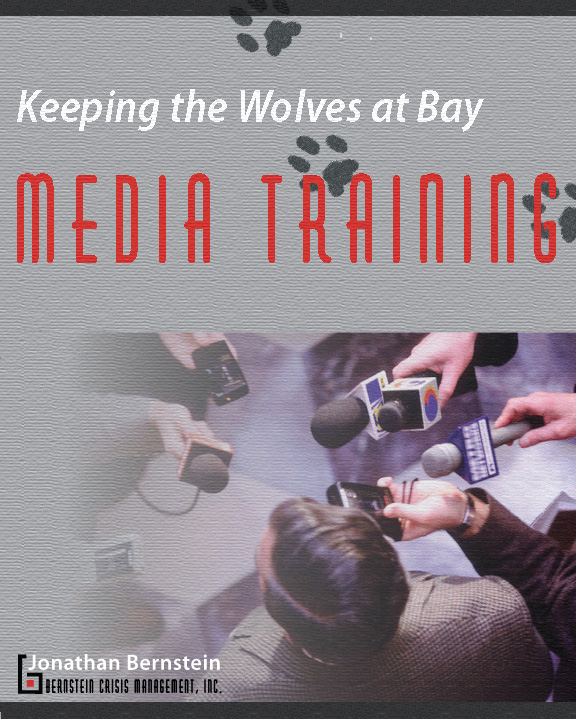JUST A THOUGHT
Too many power-hungry elected officials and wannabe elected officials are shouting "FIRE!" in the crowded theater we call the United States. Except when they do it, it's apparently not against the law.
| |
|
FROM THE EDITOR
Crisis Manager has subscribers from more than 70 countries, and a thoroughly bilingual PR professional and reader from Spain, Carlos Victor Costa, graces this edition with our lead article on leadership during crises, yet more lessons from the BP spill.
Then my tracking service delivered Ronn Torossian's piece on changing corporate perspectives regarding PR, and he has allowed it to be reprinted for your edification.
If you want more than just the education offered by this ezine, please consider browsing the Bernstein Crisis Management blog
I manage with my son Erik, or the Crisis Management blog I host over at Carter McNamara's Free Management Library.
As always, if you like what you see, please share it with others by using the "Forward Email" link at the bottom of the ezine and tell them to subscribe! IMPORTANT NOTE: If you just "Forward" using your own email program's "Forward" function and your recipient thinks they're being spammed, they can click on the Opt Out link and opt YOU off the list. So use the "Forward Email" link, please.

My best to all,
Jonathan
|
LEADERSHIP'S ROLE IN CRISES
Lessons from BPBy Carlos Victor Costa
|
[Editor's Note: This article was submitted to me at the end of July and events related to the disastrous Gulf spill have evolved somewhat. That doesn't change the lessons Carlos shares with us in this valuable commentary.]
After three months and, finally, a currently successful operation to close off the oil spill, we have been seeing
 | | Carlos Victor Costa |
recently the outcome of the critical phase of BP's crisis in the Gulf of Mexico. This phase is called "post mortem", where investigations take place, and someone has to be held accountable.
The departure of Tony Hayward as BP´s CEO - for some just a scapegoat, for others the only solution left - was a consequence of the terrible mistakes he made as the person ultimately responsible for the crisis management, and Bob Dudley, the new CEO, will have some interesting challenges to tackle:
- Overcoming the "disaster of communication" (term used by a company employee interviewed by The Financial Times) that constituted the public relations activities of BP during this crisis. What could be positioned as a genuine effort to repair the damage in a very adverse operational environment, comparable to conducting brain surgery in the dark, ended as an assault to the company´s reputation, a reason for scorn and dark humor directed at BP. After the Deepwater Horizon crisis, the newly appointed BP CEO will have to give a new face to a company with its brand image tarnished by the incompetence and lack of credibility fostered by his predecessor.
- Introducing himself as a leader 24 hours a day and, like Caesar's wife, a leader that acts honestly but also seems honest. In this case, a leader who works to manage the crisis, but did not say the crisis is a hindrance in your life (the infamous "I want my life back"), or want to unwind by playing on his yacht at sea, a sea the company polluted.
- Recovering the morale of the company. Employees, previously proud to belong to a century-old company that is part of the history of oil, a company that has some of the brightest engineers and scientists in the world, who must now be financially suffering due to the collapse of BP shares, emotionally suffering due to BP's loss of prestige. BP is now a very vulnerable company in every aspect, and a leader will have to be able to motivate people to overcome obstacles. But the exaggerated optimism of Hayward (he said in the midst of the crisis in a town hall meeting with the employees that he was "very excited" about the future of the company) will not be the best rhetoric to achieve that. I think the "blood, sweat and tears" of Churchill would be more appropriate.
- Rebuilding the reputation of the company. It is going to be almost an impossible mission, but it is essential to rebuild the reputation of BP in order to have the confidence of investors, consumers, communities, media, governments and NGOs. Above all, BP will have to work hard to attract the future employees it will need to lift the company. I doubt that BP is now among the first choices of a brilliant college student about to start his/her career.
During the Exxon Valdez crisis, the CEO of the company tried to minimize the damage, but he was criticized for taking three weeks to go to Alaska. Back them, much was discussed about the role of leader in a crisis, and the mainstream thinking was that the leader should always step up and show up at the scene of the crisis. But that is not so simple, and must be handled with care. Take the case of the Union Carbide crisis in Bhopal, during which Warren Anderson immediately flew to India, to be arrested as soon as he set foot in the airport. Yes, the CEO is the "visible face" of a company, but he is also usually the "last line of defence", therefore his entry into this complex battlefield that is a crisis (with all the subtles of reputation and issues management) should be carefully organized to build trust, not the contrary.
I believe that the problem with BP's CEO was that its communication department relied too much on Tony Hayward and the "visible face" strategy, super-exposing him to the press and to public scrutiny - while overseeing his obvious lack of skills. In this sense, I see the role of a leader, for the purposes of crisis communication, to be like the king in chess. He does not win the game, but he can spoil everything.
Recommended links:
Excellent analysis of what should be have been the functions of a leader in this crisis
Perceptions of men and women about Tony Hayward
Different situations and the same speech: Hayward's statements on Capitol Hill
The parallel between the crisis of BP and Bhopal: the lack of attention to safety
What we should expect from the new leader of BP, according to The New York Times
Carlos Victor Costa is manager at Madrid´s Llorente & Cuenca Communication consultancy. More info at http://www.comocomunicar.com or by email.
|
|
"PR" & "ISSUES MANAGEMENT"
NO LONGER DIRTY WORDS
By Ronn Torossian
Yesterday we were informed that the banking industry has regained profits bringing it close to the pre-crisis levels. The analysis of how they got there indicated that the bigger lenders performed better than those institutions who still
preferred keeping funds to themselves as opposed to benefiting the still-struggling public. I am well aware of the substantial role PR took in reaching this point for the large banks who we used to - and some still do - envy for their success. But this PR tactic did not start overnight. Analysis and insight shows that they are beginning to seriously adopt "issues management" as an effective tool which allows companies to reposition their brand in the new business environment.
Until recently, large corporations with a prestige in certain niches used to avoid using the term "PR." They'd use "corporate communications" or "marcom" to describe the management function of initiating activities directed at building relationships with their different publics. They found PR to be something to avoid, or as something to simply use to promote news, rather than as a proactive, positive tool.
Issues management is a constant public podium over which a client expresses its position, policy and direction. Wouldn't such an open channel be great coverage for many brands? Company communications and media relations need not be limited to "special" news, events and announcements. Not every company runs special events on a daily or weekly basis. But every company holds a certain expertise it prides with. Use that expertise to address ongoing issues and news. Communicate positions on ongoing debates and interests.
Here are some tips for "issues management,' a strictly-PR practice:
- What do you stand for? Make a permanent list of topics and issues you have strong positioning on or are comfortable debating. This list will be the first step in starting your issues management practice.
- What's on the public agenda? Whatever you do, make sure to be knowledgeable on what goes on in your industry. Have your ear to the ground so you don't miss out on any opportunity to voice your opinion as an expert. Issues management is a tool directed at reputation building.
- Media relations: this is where you materialize the opportunity. Learn the ways to pitch the media or hire a PR pro. The media often works in a specific way, often with a "gatekeeper" in charge of screening the timely stories from the irrelevant or inadequately written ones. Another way to communicate your issue management contents is through a company blog. Use it professionally and as a "issues management' channel and you'll find it valuable to your reputational positioning too.
- Build your reputation: if you expressed your opinion and drew attention from the media it is useless unless you build a reputation around it. The "public" element in "Public Relations' is key for results. If you don't share and disseminate it widely enough it would not do as much for your reputation. Communicate it out, and use various media channels to do so. These may include social and online media, internal publications and newsletters.
- Reputation management: Repeating this procedure over time will build your reputation and online presence too so next time a potential client, business partner or industry players search you up online they will find numerous position statements, news-based communications and professional development position of you and your company. It is priceless and invaluable to position yourself using your natural expertise.
Issues management is now known to be an integral part of a crisis management plan, a positioning and branding tool and mainly a best PR practice that is often neglected. Perhaps you could use issues management to make gain more out of the time spent following the news.
Ronn Torossian is president and CEO of 5WPR, one of the 20 largest independent PR agencies in the U.S. Named one of the top "40 Under 40" by PR Week & Advertising Age, Torossian was a semi-finalist for the Ernst & Young 2010 Entrepreneur of the Year Award, and may be reached via email at [email protected], or twitter @rtorossian5wpr.
|
|
BUSINESS ANNOUNCEMENTS
(aka blatant self-promotion)
Keeping the Wolves at Bay: Media Training
What has 80+ pages of hard-hitting, entertaining and easy-to-read guidance on how to deal with both traditional and online media during times of crisis? The answer is
Keeping the Wolves at Bay - Media Training. The, four-color, perfect-bound, 8x10 manual is currently available both in hardcopy ($25) and PDF form ($10). Volume discounts are available; write to Jonathan Bernstein for that information.
Here's a couple of teaser reviews for you:
Jonathan Bernstein's Keeping the Wolves at Bay is an eminently practical guidance for anyone - business leader, celebrity, politician - who must willingly or unwillingly face the glare of media attention. It appears
at a moment in time when the social media and other digital communications have upped the ante exponentially.
Bernstein's practicum on media relations takes on renewed urgency as news, gossip, and opinion now drive
public perception virally and at the speed of light.
Richard Levick, Esq.
President & CEO
Levick Strategic Communications, LLC
Even if you think
you'll never, ever be interviewed by the media, buy this book and read it cover
to cover. It isn't a substitute for media training. But it will give you the
tools and confidence to go head to head -- and possibly even defang -- rabid reporters,
blood-thirsty bloggers and social networking buffoons who are out to besmirch
your good name. Joan Stewart, The Publicity Hound
The book and other products can be found at the
Crisis Manager Bookstore
Want To Blog
And Tweet About
Your Organization But Don't Have Time?
Missing out on all the promotional and SEO
advantages of doing so? Hire someone to be your voice...like Erik Bernstein,
aka "Son of Crisis Manager."
More info:[email protected].
|
GUEST AUTHORS
GUEST AUTHORS are very welcome
to submit material for "Crisis Manager." There is no fee paid, but most
guest authors have reported receiving business inquiries as a result of
appearing in this publication. Case histories, experience-based
lessons, commentary on current news events and editorial opinion are
all eligible for consideration. Submission is not a guarantee of
acceptance.
|
ABOUT THE EDITOR & PUBLISHER
Jonat han Bernstein is president of Bernstein Crisis Management, Inc., a national crisis management public relations agency providing 24/7
access to crisis response professionals. The agency engages in the full
spectrum of crisis management services: crisis prevention, response,
planning & training. He has been in the public relations field
since 1982, following five-year stints in both military intelligence
and investigative reporting. Write to [email protected]. han Bernstein is president of Bernstein Crisis Management, Inc., a national crisis management public relations agency providing 24/7
access to crisis response professionals. The agency engages in the full
spectrum of crisis management services: crisis prevention, response,
planning & training. He has been in the public relations field
since 1982, following five-year stints in both military intelligence
and investigative reporting. Write to [email protected].
|
|
LEGAL
DISCLAIMER
All
information contained herein is obtained by Jonathan Bernstein from sources
believed by Jonathan Bernstein to be accurate and reliable.
Because of
the possibility of human and mechanical error as well as other factors, neither
Jonathan Bernstein nor Bernstein Crisis Management is responsible for any
errors or omissions. All information is provided "as is" without
warranty of any kind. Bernstein Crisis Management and Jonathan Bernstein make
no representations and disclaim all express, implied, and statutory warranties
of any kind to the user and/or any third party including, without limitation,
warranties as to accuracy, timeliness, completeness, merchantability, or
fitness for any particular purpose.
Unless due
to willful tortuous misconduct or gross negligence, Jonathan Bernstein and
Bernstein Crisis Management shall have no liability in tort, contract, or
otherwise (and as permitted by law, product liability), to the user and/or any
third party.
Under no
circumstance shall Bernstein Crisis Management or Jonathan Bernstein be liable
to the user and/or any third party for any lost profits or lost opportunity,
indirect, special, consequential, incidental, or punitive damages whatsoever,
even if Bernstein Crisis Management or Jonathan Bernstein has been advised of
the possibility of such damages.
A service
of this newsletter is to provide news summaries and/or snippets to readers. In
such instances articles and/or snippets will be reprinted as they are received
from the originating party or as they are displayed on the originating website
or in the original article. As we do not write the news, we merely point
readers to it, under no circumstance shall Bernstein Crisis Management or
Jonathan Bernstein be liable to the user and/or any third party for any lost
profits or lost opportunity, indirect, special, consequential, incidental, or
punitive damages whatsoever due to the distribution of said news articles or
snippets that lead readers to a full article on a news service's website, even
if Bernstein Crisis Management or Jonathan Bernstein has been advised of the
possibility of such damages. Authors of the original news story and their
publications shall be exclusively held liable. Any corrections to news stories
are not mandatory and shall be printed at the discretion of the list moderator
after evaluation on a case-by-case basis.
|
|
|
|